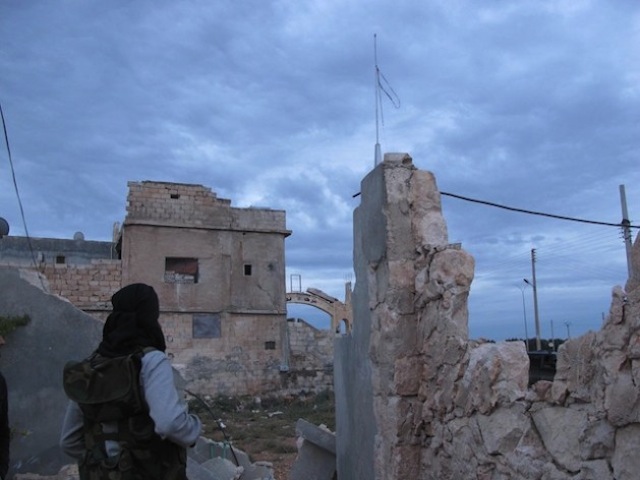by Barbara Slavin
via IPS News
A lack of Israeli pressure for the U.S. to intervene and Israel’s ability to go after sensitive targets in Syria on its own are factors in the Barack Obama administration’s reluctance to get more deeply involved in the Syrian civil war.
Despite reports that the U.S. may be reconsidering its rejection of calls to arm selected rebels, the Obama administration has shown little willingness to enter the Syrian fray.
Since the revolt against President Bashar al-Assad began nearly two years ago, the U.S. has confined itself to providing humanitarian relief to internally displaced Syrians and Syrian refugees while prodding the Syrian opposition to organise and seeking Russian buy-in for a political transition that removes Assad. Nearly 100,000 people have been killed in the fighting, with no end in sight.
“If there was a powerful push from Israel and its amen chorus in the U.S. to get in on the ground, that would change the policy overnight,” Bruce Riedel, a Middle East expert at the Brookings Institution, told IPS.
Shai Feldman, an Israel expert at Brandeis University, said that he doubted the U.S. would intervene even if Israel pressured Washington, given war fatigue after a decade of fighting in Iraq and Afghanistan. Feldman added that while Riedel’s analysis was an accurate “snapshot” of current Israeli views about Syria, those views have evolved.
Feldman described three phases of Israeli thinking on Syria: initially, a desire to keep “the devil we know;” later, the view that getting rid of Assad would strike a major blow against Iran and its ability to supply Hezbollah in Lebanon and; now, “real worries about what happens next”.
Israel can handle “extremists like Hamas in Gaza and [Hezbollah leader Hassan] Nasrallah in Lebanon,” Feldman said, but fears chaos. It worries about who will control Syria’s arsenal of weapons and who, if anyone, will check the influence of Al-Qaeda affiliates.
Israel has clearly decided to take action on its own to deal with perceived threats from Syria and to prevent sensitive weapons systems from reaching Hezbollah. Taking advantage of weakened Syrian government defences, Israel last month (Jan. 30) struck several targets, including SA-17 surface-to-air missiles stored outside a military research centre near Damascus.
Fred Hof, a former U.S. State Department official dealing with Syria, told IPS that the Israelis “hit a big parking lot where these unassembled, not yet operational air defence weapons were lined up. Because of the blast radius, some damage was also done to the [nearby] building.”
According to Time magazine, the strike also destroyed “warehouses stocked with equipment necessary for the deployment of chemical and biological weapons”. Time said the U.S. gave Israel the “green light” for the attacks.
The Wall Street Journal reported on Feb. 15 that the Israeli strike also killed a senior Iranian officer in the Quds force of the Revolutionary Guards, Gen. Hassan Shateri – also known as Husam Khoshnevis – responsible for Iranian reconstruction in Lebanon and a key liaison with Hezbollah.
Feldman said it was possible that Shateri – not the surface-to-air missiles – was the main target of the Israeli strike.
Other sources say the general and another senior Iranian officer were killed by Syrian rebels as the Iranians were driving to Damascus airport. Iranian media have blamed Shateri’s death on “Zionists” and their “allies” in Syria, which is how Iran refers to the Syrian opposition.
Israel has shown an ability to strike sensitive targets in Syria before the outbreak of civil war there. In 2008, Imad Mughniyeh – Hezbollah’s chief of operations and liaison with Iranian intelligence – died in a car bombing in Damascus widely attributed to Israel. A year earlier, Israel destroyed a nuclear reactor under construction in Syria.
The current situation affords new risks as well as opportunities for Israeli intervention. Speaking in Germany on Feb. 3, Israeli Defence Minister Ehud Barak, while not confirming Israeli responsibility for the recent strikes in Syria, said “that’s proof when we said something we mean it… we say that we don’t think it [Hezbollah] should be allowed to bring advanced weapons systems into Lebanon.”
U.S. officials have said that their red line for direct U.S. intervention in Syria would be if the Assad regime uses chemical weapons against its own people. The White House is wary of sending sophisticated weapons to Syrian rebels for fear that they might fall into the hands of jihadists such as the Al-Nusrah front, which has been put on a State Department list of terrorist organizations.
However, the issue has been the source of dissension within the Obama administration. Reacting to news that former Secretary of State Hillary Clinton – joined by outgoing Defence Secretary Leon Panetta and by the chairman of the Joint Chiefs of Staff, Gen. Martin Dempsey – favoured arming Syrian rebels, White House spokesman Jay Carney mentioned Israel as one reason why the administration had not done so.
“I can tell you that, as the president and his national security team have looked at these issues, we have had to be very careful,” Carney told reporters at a Feb. 8 briefing. “We don’t want any weapons to fall into the wrong hands and potentially further endanger the Syrian people, our ally, Israel, or the United States.”
Hof, who left the Obama administration in September and is now a senior fellow at the Atlantic Council, has advocated providing weapons to selected Syrian rebels as a way to shore up a U.S. relationship with whoever emerges victorious in Damascus. He said Tuesday that the U.S. could provide training and share intelligence if it is still queasy about arms transfers.
“It’s about establishing working relationships with carefully vetted elements,” he said. “If we’ve already decided men with arms will determine the outcome, not to have a relationship with these people will roll the dice.”





